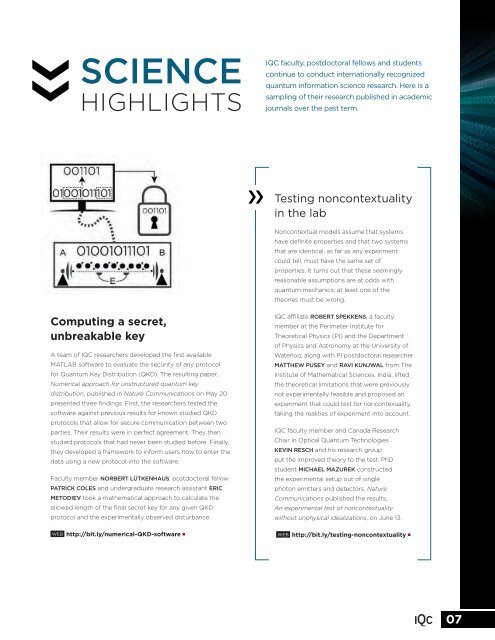this issue
LSSy309r0CO
LSSy309r0CO
Create successful ePaper yourself
Turn your PDF publications into a flip-book with our unique Google optimized e-Paper software.
SCIENCE<br />
HIGHLIGHTS<br />
IQC faculty, postdoctoral fellows and students<br />
continue to conduct internationally recognized<br />
quantum information science research. Here is a<br />
sampling of their research published in academic<br />
journals over the past term.<br />
Testing noncontextuality<br />
in the lab<br />
Noncontextual models assume that systems<br />
have definite properties and that two systems<br />
that are identical, as far as any experiment<br />
could tell, must have the same set of<br />
properties. It turns out that these seemingly<br />
reasonable assumptions are at odds with<br />
quantum mechanics; at least one of the<br />
theories must be wrong.<br />
Computing a secret,<br />
unbreakable key<br />
A team of IQC researchers developed the first available<br />
MATLAB software to evaluate the security of any protocol<br />
for Quantum Key Distribution (QKD). The resulting paper,<br />
Numerical approach for unstructured quantum key<br />
distribution, published in Nature Communications on May 20<br />
presented three findings. First, the researchers tested the<br />
software against previous results for known studied QKD<br />
protocols that allow for secure communication between two<br />
parties. Their results were in perfect agreement. They then<br />
studied protocols that had never been studied before. Finally,<br />
they developed a framework to inform users how to enter the<br />
data using a new protocol into the software.<br />
Faculty member NORBERT LÜTKENHAUS, postdoctoral fellow<br />
PATRICK COLES and undergraduate research assistant ERIC<br />
METODIEV took a mathematical approach to calculate the<br />
allowed length of the final secret key for any given QKD<br />
protocol and the experimentally observed disturbance.<br />
WEB http://bit.ly/numerical-QKD-software<br />
IQC affiliate ROBERT SPEKKENS, a faculty<br />
member at the Perimeter Institute for<br />
Theoretical Physics (PI) and the Department<br />
of Physics and Astronomy at the University of<br />
Waterloo, along with PI postdoctoral researcher<br />
MATTHEW PUSEY and RAVI KUNJWAL from The<br />
Institute of Mathematical Sciences, India, lifted<br />
the theoretical limitations that were previously<br />
not experimentally feasible and proposed an<br />
experiment that could test for noncontexuality,<br />
taking the realities of experiment into account.<br />
IQC faculty member and Canada Research<br />
Chair in Optical Quantum Technologies<br />
KEVIN RESCH and his research group<br />
put the improved theory to the test. PhD<br />
student MICHAEL MAZUREK constructed<br />
the experimental setup out of single<br />
photon emitters and detectors. Nature<br />
Communications published the results,<br />
An experimental test of noncontextuality<br />
without unphysical idealizations, on June 13.<br />
WEB http://bit.ly/testing-noncontextuality<br />
07


